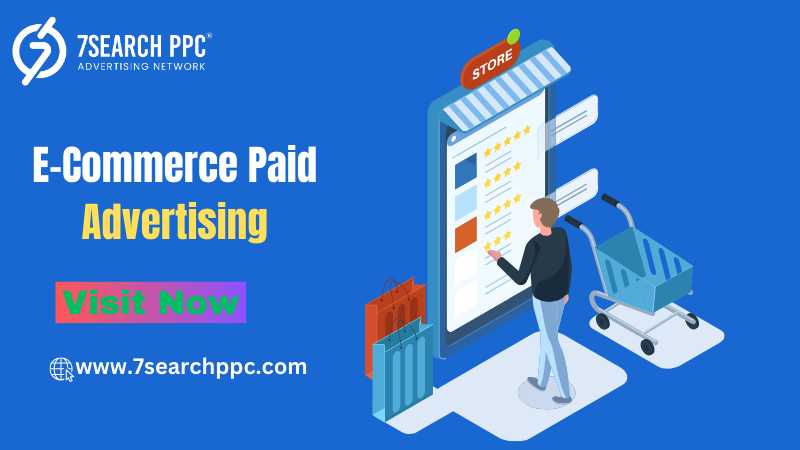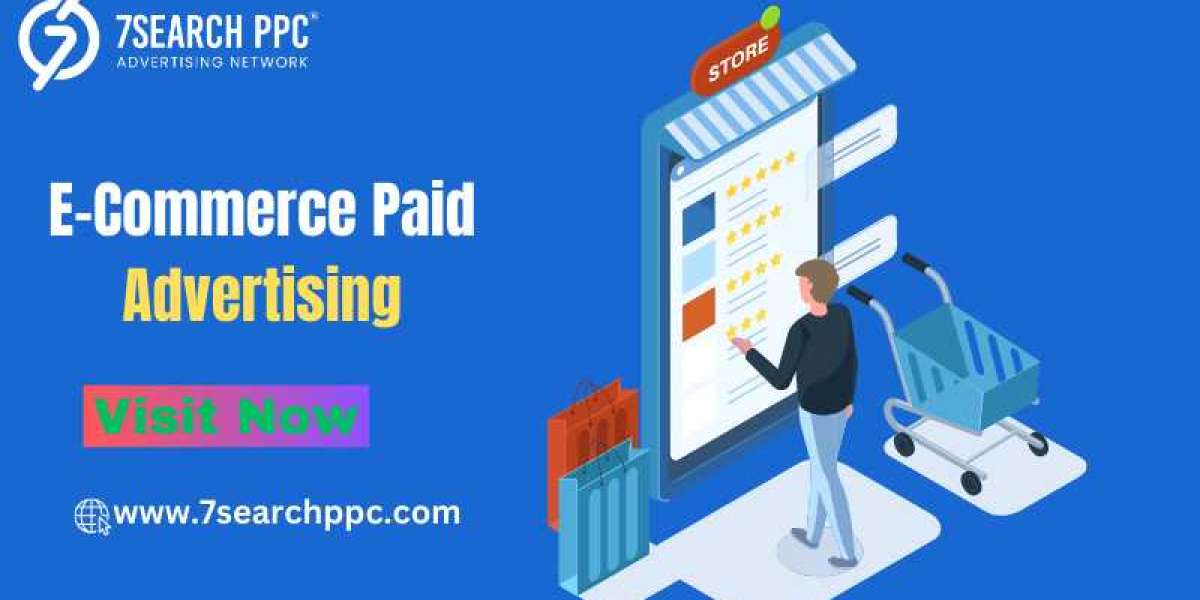In the fast-paced world of online retail, where competition is fierce and customer attention is fleeting, e-commerce businesses must make every marketing dollar count. One of the most effective ways to reach potential customers is through E-Commerce Paid Advertising. When executed properly, paid ads can drive targeted traffic to your store, increase sales, and significantly improve your return on investment (ROI). But how do you make sure that your advertising efforts yield the desired results? The answer lies in choosing the right e-commerce solution and partnering with an experienced e-commerce PPC agency that understands your business’s unique needs.
In this article, we'll explore the best strategies for leveraging e-commerce paid advertising, how to select the best ad platform for e-commerce, and how tailored services can help you effectively advertise your online store. We'll also provide answers to frequently asked questions, helping you gain a comprehensive understanding of online e-commerce advertising.

Why E-Commerce Paid Advertising Is Critical to Success
The e-commerce landscape has transformed over the last decade, with billions of people shopping online. As more businesses enter the market, cutting through the noise and reaching potential customers has become more challenging. This is where e-commerce paid advertising comes into play. Unlike organic marketing strategies, which can take time to yield results, paid ads provide an immediate way to place your products in front of the right audience.
E-commerce paid advertising allows you to:
- Target specific customer segments based on demographics, interests, and online behavior.
- Control your budget and adjust your spending based on real-time performance.
- Track performance metrics such as clicks, conversions, and sales, ensuring that you're getting the most out of your investment.
- Experiment with different ad formats (display ads, shopping ads, video ads) to find what resonates best with your audience.
But it's not enough to simply invest in paid advertising. To truly maximize ROI, you need to carefully select the best ad platform for e-commerce and craft campaigns tailored to your business's goals.
The Importance of Choosing the Right E-Commerce Solution for Advertising
When it comes to advertising your online store, choosing the right e-commerce solution is critical. An e-commerce solution typically refers to the software or platform used to build and manage your online store. However, the right solution should also integrate seamlessly with advertising platforms, enabling you to manage ads, monitor performance, and optimize campaigns efficiently.
For example, platforms like Shopify, BigCommerce, and WooCommerce offer tools that allow businesses to run effective ad campaigns directly from their dashboards. These tools integrate with major advertising platforms like Google Ads, Facebook Ads, and others, providing users with easy access to audience data, advertising spending, and real-time performance metrics.
When selecting an e-commerce solution, consider the following factors:
- Ease of Integration: Ensure the platform can easily integrate with ad networks such as Google, Facebook, and Instagram. This will help streamline the process of setting up and managing campaigns.
- Built-In Advertising Features: Some platforms offer built-in marketing tools like automated retargeting ads or AI-powered ad optimization.
- Scalability: As your business grows, your advertising needs will evolve. Choose a solution that can grow with you, whether it involves adding new advertising channels or managing higher volumes of data.
E-Commerce Paid Advertising Platforms: Which Is the Best?
One of the most important decisions you'll make when investing in e-commerce paid advertising is selecting the right platform. Each platform has its strengths, and the best one for your business depends on your goals, budget, and target audience. Here are some of the most popular options:
7Search PPC
7Search PPC is an online advertising platform that offers pay-per-click (PPC) advertising solutions for businesses looking to drive targeted traffic to their websites. It specializes in delivering high-quality traffic across various niches, including e-commerce, finance, health, and more. With affordable pricing and easy-to-use campaign management tools, 7Search PPC allows advertisers to maximize their ROI by reaching potential customers through search engines, websites, and other digital channels.
Google Ads
As one of the largest and most established online advertising platforms, Google Ads allows you to reach customers across Google's vast network of search, display, and shopping ads. With Google Shopping ads, your products can appear at the top of search results with images and prices, which often leads to higher click-through rates (CTR) and conversion rates.
Google Ads is particularly effective for businesses with a strong search-based strategy, meaning customers actively search for the products or services your store offers. Google Shopping ads and display ads are powerful tools that can help e-commerce stores reach a broader audience.
Facebook Instagram Ads
Facebook, along with its sister platform Instagram, is an excellent option for businesses that want to advertise their online store to a highly targeted audience. These platforms use advanced targeting options, allowing advertisers to segment users based on their interests, behaviors, and even prior engagement with your store.
Facebook Ads are particularly effective for visual products, and their retargeting options allow you to advertise to users who have already visited your store but didn’t make a purchase. Instagram's emphasis on visuals also makes it ideal for showcasing product collections and engaging with customers.
Amazon Ads
For businesses that sell products on Amazon, Amazon Advertising is a great way to reach in-market customers who are ready to make a purchase. Sponsored Product ads, Sponsored Brand ads, and Display ads allow you to advertise directly on the Amazon platform or across the web. Amazon Ads are particularly useful for stores looking to capture purchase-ready customers actively browsing for products.
Pinterest Ads
If your products appeal to creative and DIY-minded audiences, Pinterest Ads may be a great fit. Pinterest users are known to use the platform for inspiration, and many are in a buying mindset. Pinterest ads blend seamlessly with organic content, making them a subtle yet effective way to showcase your products.
TikTok Ads
For businesses targeting a younger demographic, TikTok Ads provide a fun and interactive way to advertise products. TikTok's algorithm pushes engaging content to users, and with the right approach, your ads can go viral, gaining massive exposure for your e-commerce store.
Microsoft Advertising (Bing Ads)
Though less popular than Google Ads, Microsoft Advertising can still be effective, especially for businesses targeting older or more professional audiences who may use Bing as their search engine. Additionally, Bing ads tend to be cheaper, so you may achieve lower cost-per-click (CPC) with this platform.
Partnering with an E-Commerce PPC Agency: Why It’s Worth It
Managing a successful paid advertising campaign requires expertise, time, and constant monitoring. This is why many e-commerce businesses choose to partner with an e-commerce PPC agency. These agencies specialize in managing pay-per-click (PPC) advertising campaigns and have the experience and tools needed to maximize ROI.
Key benefits of working with an e-commerce PPC agency include:
- Expertise in Campaign Management: PPC agencies have experience running successful ad campaigns across multiple platforms. They know how to set up and optimize campaigns to target the right audiences and increase sales.
- Continuous Optimization: Paid ad campaigns require constant optimization. From A/B testing ad copy to tweaking targeting parameters, a PPC agency ensures your campaigns are performing at their best.
- Data-Driven Insights: With access to advanced analytics and reporting tools, agencies can provide detailed insights into your campaigns’ performance, allowing for data-driven decisions.
- Time-Saving: Running and managing ad campaigns can be time-consuming. By outsourcing to a PPC agency, you can focus on running your business while the experts handle your ads.
Conclusion: E-Commerce Paid Advertising for Sustainable Growth
Effective e-commerce paid advertising is essential for driving traffic, increasing sales, and staying competitive in today’s digital marketplace. By selecting the right e-commerce solution, choosing the best ad platform for e-commerce, and potentially partnering with an experienced e-commerce PPC agency, businesses can maximize their ROI and grow sustainably.
Whether you're just starting or looking to scale your operations, investing in online e-commerce advertising is a smart strategy for any online retailer.
FAQs
What is e-commerce paid advertising?
Ans. E-commerce paid advertising refers to online advertising strategies where businesses pay to have their products or services displayed on various platforms. These ads can appear on search engines, social media, or other websites, and the business is charged based on ad performance (e.g., per click or impression).
Which is the best ad platform for e-commerce?
Ans. The best platform depends on your target audience and goals. Google Ads is great for search-driven campaigns, Facebook and Instagram are ideal for visually-driven social ads, while Amazon Ads works best for product listings.
How much does e-commerce pay advertising cost?
Ans. Costs vary depending on the platform, targeting options, and competition in your industry. It’s essential to set a budget, monitor your campaigns, and optimize for the best results.
How can an e-commerce PPC agency help my business?
Ans. An e-commerce PPC agency can manage your ad campaigns, optimize for performance, and provide insights into ad data, saving you time and helping you get the most out of your advertising budget.
Is paid advertising necessary for my e-commerce store?
Ans. While not mandatory, paid advertising can significantly boost traffic and sales, especially if you're in a competitive market or just starting. It provides quick results compared to organic marketing strategies.


